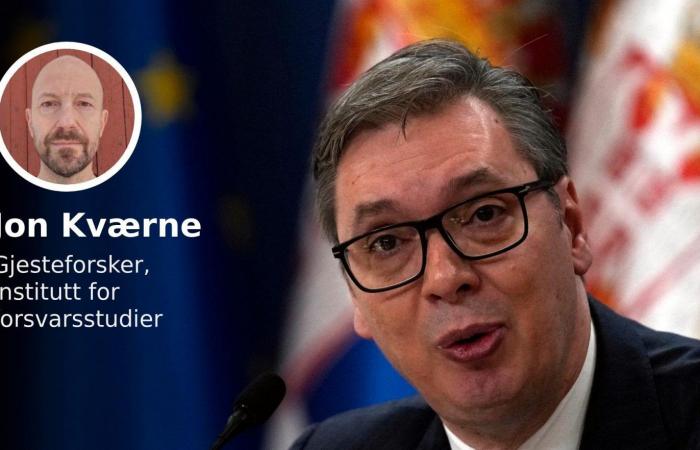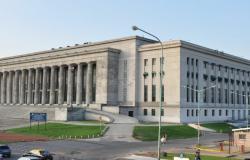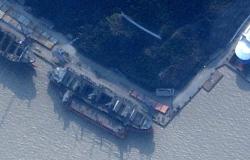Is the West moving in the right direction?
This is a chronicle. Any opinions expressed in the text are the responsibility of the writer. If you would like to send an article proposal, you can read how here.
Development in the Balkans is going in the wrong direction.
The main problem is the belief by Western actors that corrupt and authoritarian nationalists can be treated as partners – even as they continue to act in direct conflict with democratic values.
“If you kill one Serb, we will kill 100 Muslims”, threatened a young Serbian politician in 1995. Statements like this led him to the heights of power instead of to the war crimes tribunal in The Hague. Today he is Serbia’s president and is received with pomp and splendor on an official visit to Norway. Without him distancing himself from his words.
Violent clashes cannot be ruled out
The tensions from the 90s continue to dominate several of the countries in the former Yugoslavia. New wars are not likely, but we cannot rule out violent clashes. Especially if actors such as Russia are given room to exploit the tensions that exist.
For several decades, the West has tried to help the countries of the former Yugoslavia to become well-functioning societies. This has been based on a central assumption that the countries want to become part of the EU. However, it is now obvious that this assumption does not hold.
Many Balkan politicians see no benefit in becoming democrats when they have managed to stay in power as nationalists. They say they will carry out reforms, but at home they undermine the press, the judiciary and all other institutions. And shamelessly steals from the state’s resources.
Slovenia and Croatia are already members of both NATO and the EU and are not threatened by further unrest. By contrast, the situation in Bosnia-Herzegovina and Montenegro is characterized by rapidly increasing ethnic polarization and gradual institutional breakdown. Kosovo is exposed to violent demonstrations and destabilization from outside. Serbia is the region’s most powerful actor and is responsible for much of the development – including that which we see in the neighboring countries.
History is falsified
In Serbia, the ideology of the Milosevic era has been completely rehabilitated. Not so surprising when today’s leader, mentioned President Aleksandar Vucic, was Milosevic’s propaganda minister and today’s foreign minister was Milosevic’s press spokesman. In their Serbia, large murals of war criminals are appearing as well as recent tributes to Putin and the Wagner group.
The president and the government falsify history, while the press, which is controlled by the authorities, is filled with nationalist rhetoric. Police officers publicly sing about carrying out new massacres against Serbia’s minorities – without reaction.
The question then becomes why Western diplomats and special envoys – also Norwegian – continue to let these very leaders set the conditions for further development in the region. At the expense of the vulnerable neighboring countries.
Forced through legislative changes
In Bosnia (where Croatia also plays a distinctly negative role), the West has recently forced through legislative changes that cement ethnic divisions and strengthen corrupt, Russian-backed leaders’ grip on power. It would do well to find a diplomat who can explain how strengthening Moscow’s local partners is in line with our interests.
In Kosovo, a united Western diplomatic corps is pushing for the creation of a separate “Serbian” administrative unit in the country. Although such an institution will in all likelihood be misused to undermine the state. The argument is that previously concluded framework agreements must be complied with. Even where these are unclear and entered into in an undemocratic manner.
Albanian politicians protesting, especially the country’s Prime Minister Albin Kurti, are labeled as “inflexible” and “dogmatic” by Western diplomats. This is despite the fact that Kurti is one of the few top politicians in the Balkans who is not suspected of corruption, and has fought consistently and principledly for democratic values.
Paradoxical situation
But today we have thus ended up in a paradoxical situation where we support corrupt autocrats to a greater extent than politicians who share our values. How could this happen?
The most important explanation is that Western politicians and diplomats constantly fear renewed unrest in the Balkans, but not enough to take the burden of confronting those who actually create it. Instead, they put pressure on the parties they see as less threatening. Belgrade understands this and stages dramatic situations, which they are then rewarded for ending.
This is not unlike the situation Russia succeeded in maintaining on the international stage for many years: the Kremlin ensured restraint on the part of the West by deliberately portraying itself as a dangerous and unpredictable actor.
The diplomats try to camouflage concessions with rhetoric about equal “parties” where “both sides must lower the level of tension”. And they talk about “competing nationalists”. However, the truth is that the “parties” are far from equal. There are no other countries in the region where propaganda and falsification of history permeate society to the same degree as in Serbia.
The belief that we can rely on the nationalists from the 90s has so far not produced the results the West hoped for. Our inaction in the face of aggressive nationalism has made renewed conflict more likely, not less. It is therefore time for a new approach – but which one?
We should stop being intimidated
The answer is stumbling close. The West should return to a policy that respects the values our own societies are founded on. We should stop being intimidated by the autocrats’ threats. Instead, we should give decisive support to actors who, through action, show that they share our values. Ideals are not theoretical quantities, but rules to remember for practices that time and time again prove useful.
These rules are just as relevant in the Balkans as in our own societies. We must insist on them, even when the autocrats protest. They need the West’s money and the legitimacy it gives to be included in the good international company. These are resources the West’s representatives can deny them. The real capacities of democracies are, after all, enormous. Threats from autocrats should therefore be met with a clear message that they will lose out of a conflict.
By returning to a value-based policy, the West can once again have a chance to contribute to stability and development in the Balkans. Norwegian foreign policy should also contribute to this.
Jon Kværne, visiting researcher at the Department of Defense Studies, former assistant to the defense attaché at the Norwegian Embassy in Belgrade (2019–2021)
Tags: Dangerous developments Balkans
-





